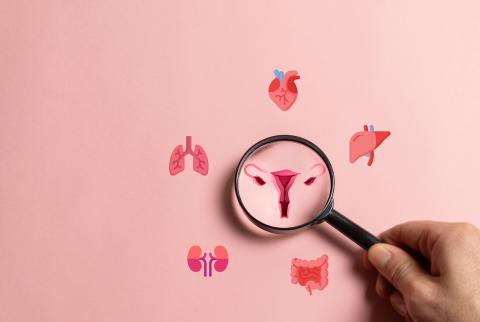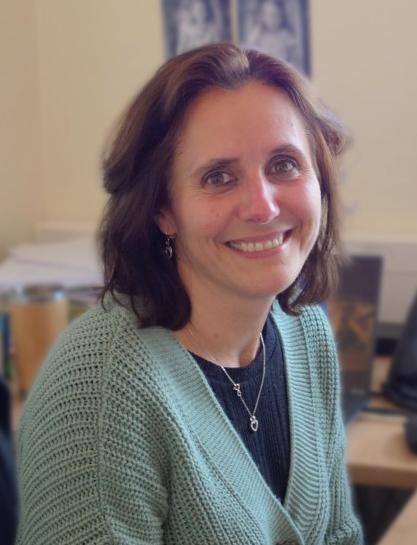
Marianne Canonico: the influence of hormones on health
Marianne Canonico is a researcher and epidemiologist at the Centre for Epidemiology and Population Health (CESP - Univ. Paris-Saclay/French National Institute of Health and Medical Research, Inserm/UVSQ). Her work focuses on exploring the influence of hormones on health, particularly women's health. An associate professor at Université Paris Saclay, she is also director of the Doctoral School of Public Health (Université Paris-Saclay, Université Paris-Est Créteil), reflecting her strong commitment to knowledge transmission and the development of younger generations.
Originally from Nice, Marianne Canonico studied biology at the Université Côte d'Azur following her science baccalaureate. Her interest in endocrinology emerged during her 1st year Master’s, sparked by a course given by a passionate lecturer. In 1999, she moved to Paris to continue her education with a 2nd year Master’s in cell signalling and endocrinology at the Faculty of Medicine at Université Paris-Sud (now Université Paris-Saclay). She undertook her internship in a neuroendocrinology laboratory, where she went on to complete her PhD thesis on the role of the melatoninergic system in mammary carcinogenesis. "The idea was to study mammary tumours, which are often linked to hormonal exposure," she explains. "The brain contains a gland that secretes melatonin, a hormone best known for regulating the sleep/wake cycle, but which also has anti-oestrogenic effects. When that cycle is disrupted, it may promote tumour progression."
Towards epidemiology and public health
The young PhD candidate, already a mother, defended her thesis in 2003 while expecting her second child. "This was a conscious decision," she confirms. Two more children would follow later in her career, during which it has always been important to maintain a healthy work–life balance. After her thesis, she shifted her focus to researching epidemiology and public health, joining the Cardiovascular Epidemiology Unit at Inserm in Villejuif. "I loved doing experimental research during my PhD, but I also wanted to see its application in more tangible terms," recalls Marianne Canonico. In 2006, she completed her training with an institutional degree (DU) in biostatistics, and in 2008, in order to meet Inserm recruitment requirements, she embarked on a year-long postdoctoral fellowship at Oxford University, taking her two young children with her.
Upon returning to France, the researcher joined the unit that would become the Centre for Epidemiology and Population Health (CESP). "My background in endocrinology enriched the team's work on cardiovascular disease and made it possible to study the role of hormones in pulmonary embolism and venous thrombosis. Later, I extended my research to arterial diseases, including strokes and heart attacks." In 2009, she successfully passed the Inserm research fellow competitive exam, obtaining her Accreditation to Supervise Research (HDR) in 2015.
Hormonal exposure and ageing
Hormonal exposure is a major biological difference between men and women. "We see that many pathologies show significantly different incidence rates between the sexes, particularly around the time of menopause. This leads us to believe that hormonal exposure in women plays a genuine role in many pathologies," explains Marianne Canonico. "This is the central theme of all my research projects. They all revolve around hormonal exposure, whether endogenous, meaning it relates to the characteristics of reproductive life (age of first menstruation, menopause, number of pregnancies, breastfeeding, etc.), or exogenous, such as exposure linked to the use of hormones (contraceptives, fertility treatments, other hormonal treatments, especially around menopause, etc.)."
Today, the researcher is investigating the relationship between hormonal exposure and age-related diseases. Supported by the French National Research Agency (ANR), Marianne Canonico and Alexis Elbaz, the deputy director of the CESP's Exposome, Heredity, Cancer and Health team in which she works, are leading a project on risk factors for Parkinson's disease in women. The project is based on data from the E3N cohort. "This is the largest cohort study of this disease in women. We are studying the risk of developing this neurodegenerative disease in relation to hormonal factors. This helps us to gain a better understanding of its etiology and identify at-risk sub-groups which can guide prevention strategies."
As part of a thesis by a PhD candidate she supervised, the researcher is also finalising publications on the influence of hormones on physical performance. At the same time, she is currently mentoring a PhD candidate whose research focuses on the role of hormonal exposure in the development of lung cancer, a study specifically centred on women. This project is particularly significant for the researcher. It was initiated by Isabelle Stücker, former Inserm research director at CESP who passed away in 2020. Marianne Canonico was responsible for developing the "women's" questionnaire which documented the participants' hormonal history. Finally, the researcher is now planning to relaunch a research project on hormones and venous thrombosis, a subject she has explored in the past.
Supporting students
Since 2009, Marianne Canonico has taught modules at the annual epidemiology summer school at Bicêtre Hospital and it was during these sessions that she discovered a passion for teaching. This interest continued to grow, and in 2015 she took charge of a module in the 2nd year Master’s in public health research, which she has co-directed with Xavier Paoletti since the start of the 2024/2025 academic year.
In 2019, together with two colleagues from the same generation, Florence Menegaux and Raphaëlle Varraso, she took on the leadership of the Doctoral School (DS) of Public Health at Université Paris-Saclay and Université Paris-Est Créteil. "We inherited a doctoral school that was both supportive and demanding. From 2019 to 2024, we continued to build a highly promising professional and collaborative environment. Today, our public health education has a reputation for excellence. We know that a PhD student who has spent three years questioning their assumptions and producing a thesis has all the qualities needed to succeed, whether in academia or industry."
The doctoral programme, a human and scientific journey
Appointed director of the Doctoral School in September 2024, Marianne Canonico continues to pursue her commitments. "I deeply value human contact, teaching, sharing and helping others to understand. Educating PhD candidates is something I care very strongly about." A recipient of several awards for her own research, the researcher does her utmost to encourage and help her PhD candidates to achieve their full potential. "The PhD candidate and their thesis supervisor overcome challenges and share successes together over three years. For me, the human journey is inseparable from the scientific one," she concludes.
Read more on the same topic :
- The article published in L'Édition n°26 : Menopause, demystifying a taboo for women's health
https://www.universite-paris-saclay.fr/en/news/menopause-demystifying-taboo-womens-health

